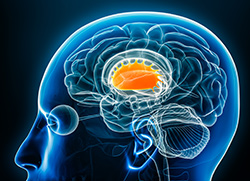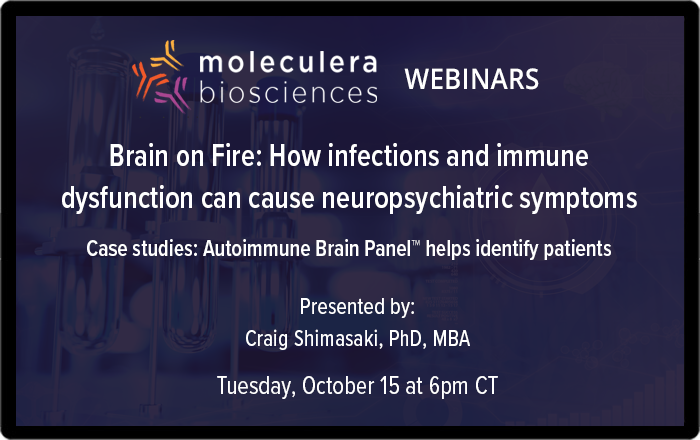Brain on Fire: How infections and immune dysfunction can cause neuropsychiatric symptoms
Did you know that an autoimmune dysfunction can trigger neuropsychiatric symptoms?
Patients with infection-triggered autoimmune neuropsychiatric disorders are often misdiagnosed with a primary neurologic or psychiatric illness, when they, in fact, have a treatable autoimmune condition.
Infections disrupt immune system and impact the brain
 Common infections (i.e., strep, mycoplasma pneumonia and coxsackie virus) can trigger the immune system to produce autoantibodies to destroy the harmful pathogens (i.e., bacteria, viruses). But in some people, the immune system goes awry and these autoantibodies mistakenly attack healthy cells in a region of the brain known as the basal ganglia. The basal ganglia is responsible for motor control, as well as executive functions and behaviors, and emotions.
Common infections (i.e., strep, mycoplasma pneumonia and coxsackie virus) can trigger the immune system to produce autoantibodies to destroy the harmful pathogens (i.e., bacteria, viruses). But in some people, the immune system goes awry and these autoantibodies mistakenly attack healthy cells in a region of the brain known as the basal ganglia. The basal ganglia is responsible for motor control, as well as executive functions and behaviors, and emotions.
When this occurs, it can cause brain inflammation and disrupt how cells and receptors function. This, in turn, leads to the onset of various neuropsychiatric symptoms, including OCD-like behaviors, ADHD, tics, anxiety, and depression.
Only test of its kind
The Autoimmune Brain Panel™, backed by more than two decades of research, is the only test of its kind that can assist clinicians in diagnosing and treating immune-mediated neuropsychiatric disorders.
Identifying an autoimmune process is important, since treatment focuses on eradicating the infection(s) and supporting the immune system, rather than treating solely with psychotropic medications.
Webinar Schedule
About The Webinar
Could your treatment-resistant symptoms be due to an underlying infection-triggered autoimmune response? This presentation will review how infections and an immune dysfunction can induce various neurologic and psychiatric symptoms.
Infections, such as strep and other common infections, can trigger an autoimmune response whereby autoantibodies mistakenly attack portions of the brain, resulting in a range of neuropsychiatric symptoms including OCD, tics, depression, anxiety and even seizure-like movements.
In this presentation, we will describe the interconnection between infections, our immune system, and the brain and how a dysfunctional immune response can result in neuropsychiatric symptoms. We will describe some signs and symptoms that may help identify if an individual who may be suffering from an autoimmune neuropsychiatric disorder versus a primary neurologic or psychiatric disorder.
We will also review how the Autoimmune Brain Panel™ can assist clinicians in determining whether neurologic or psychiatric symptoms may be due to an autoimmune response and highlight several cases of patients who tested positive on the Panel and were successfully treated with a resolution in symptoms.
We look forward to seeing you online!
Webinar Presenter
Craig Shimasaki, PhD, MBA
 Craig Shimasaki is President and CEO of Moleculera Biosciences, a neuroimmunology precision medicine company focused on identifying underlying roots of neurologic, psychiatric, and behavioral disorders triggered by an autoimmune response. He is a medical research scientist with over 35 years of translational development experience in biochemical interactions, molecular biology, viral pathogenesis and infection-triggered neuropsychiatric disorders.
Craig Shimasaki is President and CEO of Moleculera Biosciences, a neuroimmunology precision medicine company focused on identifying underlying roots of neurologic, psychiatric, and behavioral disorders triggered by an autoimmune response. He is a medical research scientist with over 35 years of translational development experience in biochemical interactions, molecular biology, viral pathogenesis and infection-triggered neuropsychiatric disorders.
Dr. Shimasaki has worked at all stages of research and development from bench to bedside. His research included epitope mapping of HIV proteins, genetic based risk predictors of breast cancer, influenza and RSV diagnostics and therapeutics and pathogenesis of infection triggered neuropsychiatric disorders. As a businessperson, he co-founded multiple companies and led multiple products through the FDA approval process and is a co-inventor on multiple patents.
Dr. Shimasaki started his career at Genentech. He received his BS in Biochemistry from University of California at Davis, his PhD in Molecular Biology from the University of Tulsa, and his MBA from Northwestern University, Kellogg School of Business. He is an Adjunct Professor at the University of Oklahoma where he teaches biotechnology entrepreneurship. His passion is to help translate scientific and medical discoveries into acutely needed products so that more patients can live healthier lives.


